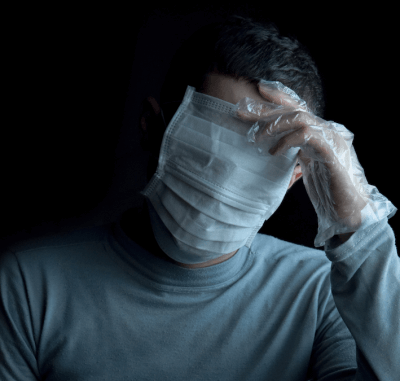Do I Have a Mental Ilness or am I Overreacting?”

photo by: Amin Moshrefi
by Andrea M. Darcy
Not sure if a person you know is just overreacting to life, or is actually dealing with a mental illness? Or is it you that is acting out of sorts, and you don’t know if you need help?
Mental illness vs mental health issue
Now is a good time to point out that ‘mental illness’ can be considered stigmatising tho those with mental health challenges.
The preferred language to use can be ‘mental health issue’. Note that most mental health issues are NOT illnesses we see under a microscope. Mental health diagnoses are generally groups of symptoms shared by many people.
And in the case of things like anxiety and depression, they can be a healthy response to a very unhealthy situation. If you experienced a trauma like, say, being attacked? NOT being affected would be far more troubling than feeling depressed or anxious after.
How to recognise a mental health crisis
It’s important to recognise when you or someone else is in the middle of a mental health crisis. If this is the case, it is not about wondering if it’s a mental illness but about getting getting immediate help. This includes if you or they are:
- hurting or are going to hurt themselves or others
- hallucinating, speaking about things that are not real
- and are becoming violent
- have barricaded themselves in somewhere in a way that is dangerous.
You can take them or yourself to an emergency room. Or, if it seems things are calm enough that nobody is in physical danger, call a mental health crisis line.
Is it a mental health issue?
So now back to having a mental health issue. What are the signs you or a loved one is experiencing a mental health issue?
1. Unusual swings of emotions.
Some of us are just naturally emotional people. But notice if the change in emotional output is unusual, or very marked.
- Do the emotions match the situation at hand, or are they too big?
- Can you stop the emotional outpouring or is it out of control?
- Do you even know what the emotions are about or are they random?
- Are you going from zero to one hundred emotionally?
Depression and post-traumatic stress disorder (PTSD) can mean we find ourselves randomly sad and crying.But so too can emotional shock from a difficult experience, which can last a few weeks but generally then clears up.
If emotions are suddenly very big and out of the blue, and come with a huge rush of energy and symptoms like talking fast? It can be a sign of mania and bipolar disorder. Notice that if someone is having a bipolar episode, they won’t feel anything is wrong.

photo by: Christian Fregnan
2. Anger and lashing out.
Sometimes the emotion we feel when suffering with mental health issues is blinding anger.
Again, post-traumatic stress disorder or shock might be the issue. It leaves you very on edge and with a fight, flight, or freeze response that is out of control.
The onset of schizophrenia can also involve anger.
Sudden outpourings of anger are also a common sign of addiction problems. The lack of addictive substance causes extreme tension that can roll into anger and rage. Is the other person known to have issues with addiction? Or if it’s you, is it time to admit that a bad habit has rolled into an addiction?
3. Changes to the way you think.
Our thoughts are often the first sign we have a mental health issue.
- With depression, your thoughts will be very dark and about your past, constantly going over things in a negative light.
- With anxiety, your thoughts will be racing and increasingly illogical, and will be about a future and all that can go wrong.
- Intrusive thoughts telling you to do strange things can be a sign of obsessive compulsive disorder (OCD).
- Thinking you are hearing voices can be a sign of schizophrenia.
4. Immobilised by fear and paranoia.
Fear can happen to the best of us. But if we are immobilised by it, or we have paranoia, it can be a sign of a mental health illness.
Generalised anxiety disorder feeds on fear and a diet of increasingly illogical thoughts. It can then turn into panic disorder.
Paranoia can also be a sign of schizophrenia which can be triggered by chronic stress.

By: adohnes
5. Making big unrealistic plans.
Has a friend called your ranting about their amazing plan for you all to leave society behind, immediately, tomorrow! To create a countryside commune! Or are they saying anything else unreasonable, while also talking faster than usual, and seeming overconfident?
Check to see if he or she has bipolar disorder.
6. Unsafe behaviours and mental illness.
When we start throwing caution to the wind in ways that are unusual for us, it can signal a mental health crisis.
Depression can leave us feeling like we have no future and nothing matters. So why not do something destructive? Like unprotected sex or a drug binge?
Recklessness can also be a sign of bipolar disorder.
7. A sudden decline in self-care and hygiene.
Stopped doing things you always did, like exercise? And even let the personal hygiene drop? Not washing your hair, skipped your shower when you never do? Changes to personal care are often a sign of depression.
8. Practicing self-harm.
This doesn’t have to just look like cutting or burning yourself. It can be things like unsafe sex, not dressing for the elements, refusing to let yourself eat… anything where you purposely make yourself suffer or experience pain.
9. Changes to social patterns.
Look for changes to your personal baseline. Are you suddenly going out every night and talking to strangers when you never do? Or are you now staying home and avoiding friends when you are known for being a social butterfly?
 10. Sleeplessness.
10. Sleeplessness.
Sleeplessness is a related symptom to so many mental health diagnoses researchers are not sure what comes first. One makes you vulnerable to the other
11. Not able to maintain your daily life.
Suddenly can’t cope? Again, mental health issues often mean our thinking is high jacked. When our mind is occupied our coping skills slide. For example, depression can leave us with brain fog. And anxiety, if it goes into overdrive, can lead our brain so busy with illogical thinking that we can’t function well.
How long have you had symptoms?
Life can be very challenging at times. Bad things can happen. We can all go through moments of emotional shock, or grief, or big upset. If you know why you are feeling the way you are, and it’s around a certain event, you might just be experiencing a natural emotional response that will pass.
Mental health issues don’t always have an obvious cause. They just seem to come out of nowhere sometimes. And they linger. If it is a mental health problem it will go on for several weeks or months.
What do I do if a loved one seems triggered?
If someone is experiencing mental health issues, it can be harder than usual to communicate with them.
Do reach out anyway – what matters is that the other person feels cared for. But if possible educate yourself first on best ways to help those in distress, such as by reading our articles:
- Helping Someone Who is Suicidal
- Dating Someone With Depression
- How to Help a Partner With Depression, Anxiety, and Childhood Issues
- How to Deal With a Teen With Depression
- Telling a Loved One or Friend They Need Counselling.
Want to offer counselling to a loved one or friend in distress? Or need some for yourself in these troubled times? Our roster of top London therapists is now available by telephone or online. Or use our booking platform that connects you to a huge array of online counsellors for every budget.
Still have a question about mental health issues during a global pandemic? Post below.





I have bpd I’m currently not giving a shit about my life anymore I feel like I have pushed everyone away and I know it’s my fault I’m unbearable
Hi there. So here’s the thing. “You” and “BPD” are not the same thing. You are not a diagnosis, you are a complex human who is more than just BPD. Have you ever sat really quietly, perhaps done some mindfulness meditation, and felt a sort of other “You” behind all your racing thoughts and feelings? That’s who you really are. The problem is that when we have BPD we get hijacked by our emotions and out of control thinking. The real us gets buried and then we are left feeling ashamed and lonely for actions and words we didn’t even want to do. It’s really tough. But the thing that is really important is that you know that’s not ‘you’. Don’t lose sight of that. No matter how hard it gets. It’s really important you somehow find a way to keep sensing the real you, whether that is by mindfulness, or some creative art form, whatever it is that helps you feel like you. Then it’s about being honest with those you love that you really want to be yourself but are struggling, and trusting they too can see your real self behind the behaviours. And then it’s about seeking support to bit by bit start to gain control of the thinking and behaviours that see you acting out and living in a terrible cycle of hope and shame. Yes, it probably sounds like a lot of hard work. It can be! And having BPD can be hard. But it also makes you fun, exciting, able to understand others more than most, you also will have many gifts to offer, nobody is all only one sided, and BPD also happens as we are sensitive people, and that sensitivity also brings positives. Best, HT.